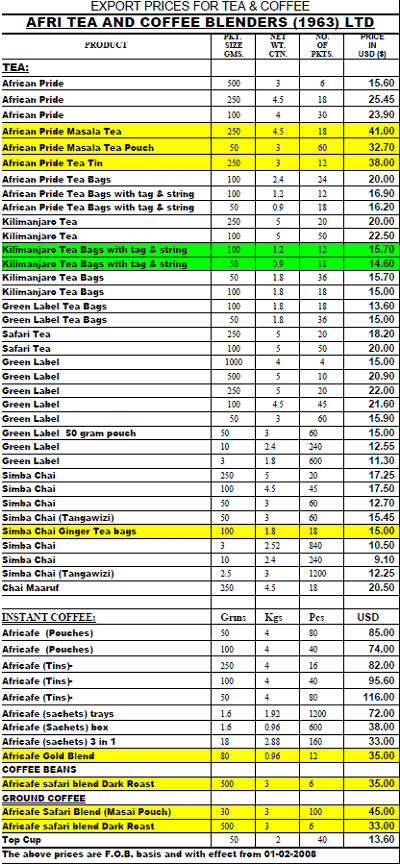 Afri Tea & Coffee LTD (ACTB)
Afri Tea & Coffee LTD (ACTB)
All data are collected in the Fiscal Year of 2008-2009.
Company Profile and History
Established in 1963 as Brookebond Tanganyika Ltd, managed by London based Brookebond group of companies until it changed ownership to Tanzania Tea Blenders Ltd run by the Government through the Tanzania Tea Authority (T.T.A). In September 2002, the Government sold it to a private company which later changed its name to Tanzania Tea Blenders (2002) Ltd. In October 2008, the company changed its name to Afri Tea and Coffee Blenders (1963) Ltd.
Afri Tea and Coffee Blenders (1963) Ltd operates in 11 regions in Tanzania with 9 Branches & 1 Agent, and supplies to all conventional supermarkets, discount stores, wholesalers, retailers and hotels & institutions.
Afri Tea and Coffee Blenders (1963) gets its supplies from Lupembe Tea Estate in Njombe, Iringa region, where high quality clonel tea is grown, the Mponde Tea Factory in Lushoto, Tanga region and Unilever Teas. The company’s Africafe is an internationally acclaimed instant coffee. According to the company, Africafe is the only packed instant coffee exported to the Japanese market from East Africa.
The Factory has a capacity of more than 3000MT per annum for tea, a capacity of more than 300MT per year for Instant Coffee powder and 750 MT per year for roasted and ground coffee.
The company has an IMO certificate for Processing & Marketing of Organic products. The company became an ISO 9001:2000 Certified Company in April 2008.
In Country Location
Lugoda Street, Dar es Salaam, Tanzania:
Telephone: +255 (22) 2112430 +255 (22) 2131145;
Fax: +255 (22) 2115347
Services and Products
The major activities of the company are: Blending and packing of teas; packing instant coffee powder; and roasting, grinding and packing pure coffee. Africafe is a spray dried 100% pure instant coffee powder with no additives made from high quality Arabica and robusta coffee beans.
Tea products include: African Pride Tea; African Pride Tea bags; African Pride Masala Tea; Kilimanjaro Tea (Loose); Kilimanjaro Tea Bags; Kilimanjaro Tea Bags with tag; Safari Tea; Green label Tea; Green label Tea Bags; and Simba Chai.
Coffee products include: Africafe Pure Instant Coffee (Tins); Africafe Pure Instant Coffee ( Sachets); Africafe 3 in 1 mix; Africafe Gold; and Africafe Safari
Number of Employees
123 employees
Financial Information
Turnover of Tshs 900 millions per month (2008)

Market Share
The company’s market share in the tea sector is approximately 51 percent and more than 90 percent in the Instant Coffee sector.
Business Objective
“To improve tea production and quality, through improved farming practices, to a level where building a second factory by 2012 will be inevitable”
Business Model
The company’s strategy is to grow its share in the domestic and international markets by adding new products and improving current products; aggressively marketing its quality products through promotions, advertising and distribution; and expand its blending, packaging & branding services.
It has already improved the packaging of products by: using printed inner liners; printed cellophane sheets to cover packets; production record in batches to identify fake packets; adding date of manufacturing, batch number and date of expiry; all information is computerized; and each packet bears a serial number.
Ownership of Business
The company is wholly owned by Lushoto Tea Company
Benefits Offered and Relations with Government
Before the tea industry was liberalized, Tanzania Tea Blenders, Ltd. (now Afri Tea and Coffee Blenders (1963) Ltd) was a government-owned monopoly, which handled tea blending, packing, and distribution for domestic consumption. Despite the restructuring of the tea sector, both the Tea Board and the Ministry of Agriculture and Food Security still have too much discretionary power. For example, Article 22 of the Tea Act of 1997 indicates that the Tea Board may refuse licenses on “any ground which may appear to it to be sufficient.” Article 29 of the 1999 Tea Regulations states that “the Board shall, in issues relating to quality in respect of domestic and ex-port market, be the final arbitrator.”
Penalties for violating Tea Board regulations are high-often as high as US$ 2,000, which is 10 times per capita GDP (equivalent to a fine of US$300,000 in the United States). Despite such stiff penalties a third of Tanzania’s domestic tea demand is supplied by “prohibited” imports, implying that tea smugglers are not caught (the ban is ineffective) or are caught and not fined (the ban spawns corruption.)
Tea producers are subject to as many as 44 taxes, levies, and licenses. The payroll levy on tea estates, a major financial burden, discourages employment by effectively increasing the wage rate.
Taxes on the tea sector include a district produce cess of 5 percent of the farmers’ price, stamp duty of 1.2 percent fob, withholding tax of 2 percent fob, 3.5 percent Tea Board and research fee, corporate tax, property tax, VAT, and a service levy of 0.3 percent of VAT net turnover. The 2 percent export tax was abolished in July 1998, and the agricultural land tax was reduced from 600 Tanzanian shillings (Tsh) a hectare to Tsh 200 a hectare (as of November 2001, the exchange rate was 900 Tsh to the US dollar.)
Product Development
Between 2007 and 2009 the company launched several new products. These are: Kilimanjaro Infusions Herbal teas; English Breakfast Tea, Earl Grey Tea and Iced Tea; health teas including Hibiscus, Camomile, Rooibos and Green Tea; Africafe Safari Blend Ground Coffees (Dark Roast, Medium Grind); Africafe Safari Blend Coffee Beans (Dark Roast); African Pride Tea - Gold Blend (250 grams); Green Label (50 grams pouch); and Simba Chai Tangawizi (50gms) & Simba Chai (10gms).




